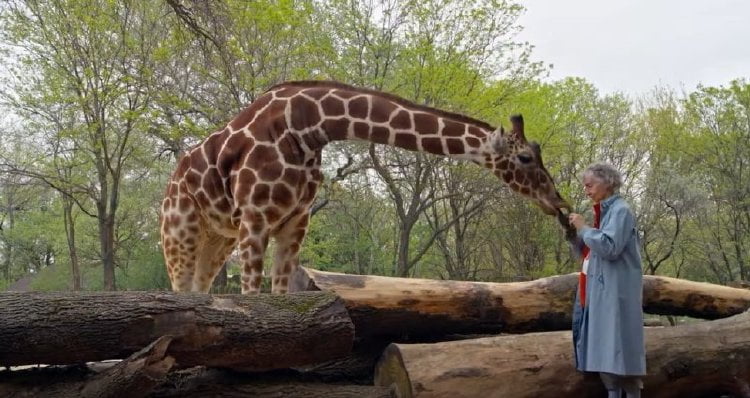The Woman Who Loves Giraffes

Many people are familiar with Dian Fossey and her studies of the Silverback gorilla and Jan Goodall and her observations of chimpanzees in the wild. Few though have heard of the woman. Anne Innis Dagg, who was ahead of them both as “The Woman Who Loves Giraffes.”
Laura's Review: C+
Most know the names of Jane Goodall and Dian Fossey, as well as their field work with apes, but four years before either of them began their work, Anne Innis Dagg journeyed by herself from Canada to South Africa to study the animal whose beauty fascinated her – the giraffe. Not only was she the first woman to chronicle an African animal, outside of a Scottish study on red deer, she was the first person to ever study any animal in the wild. Alison Reid’s film acknowledges her subject’s obscurity from its first frame – a ‘To Tell the Truth’ episode in which no one correctly identifies Dagg – before venturing into the difficulties this young woman faced getting anyone to sponsor her or take her seriously.
There is stunning footage of giraffes in the wild as we witness the incredible level of detail Dagg noted about every aspect of her chosen subject. The book she eventually published is considered the ‘Bible’ on the subject of the giraffe. But while this extraordinary woman’s tale is one that should be told, Reid’s focus on her inability to secure tenure and her fade into obscurity before a rediscovery overtakes her actual accomplishments, weighing the film down despite the necessary exploration of the sexism which held Dagg back. This is an 83 minute film which feels like it would be better served as a one hour PBS offering.
Robin's Review: B-
I admit that I am one of the many people mentioned above. I knew nothing about Anne Dagg and anticipated the equivalent of the works about Fossey and Goodall and their groundbreaking animals-in-their-natural-habitat studies. And, the beginning of “The Woman Who Loves Giraffes” is about just that – a 24-year old white woman who travels, alone, to the African veldt to study the strange, long-necked creatures.
But, her works in Africa (The Giraffe is still considered the bible by animal anthropologists on giraffe behavior) were not enough to gain her the thing that academicians yearn for most – tenure. The bulk of this documentary by stunt-coordinator turned feature director Alison Reid is about Dagg’s battles for tenure and academic equality for women – a battle she fought for decades,
The story of Dagg’s journeys and her research is the thing I wanted as I sat down to watch “The Woman Who Loves Giraffes.” When it shifted gears from the study of a fascinating animal species to a study of white man’s suppression of women, I was disappointed that more was not made of her groundbreaking study. Still, I was educated and entertained and, once again, the film shows the desperate need for true equality between the sexes, even today.

